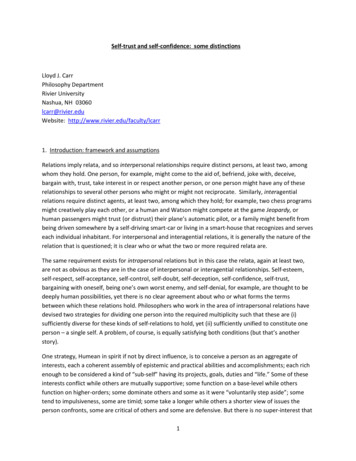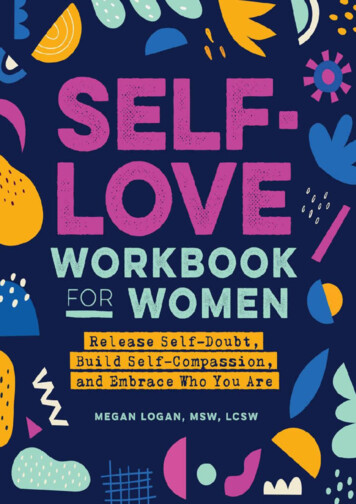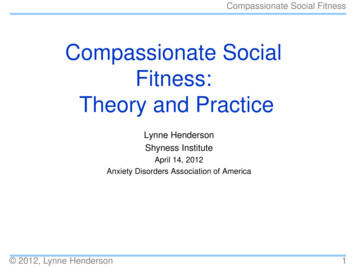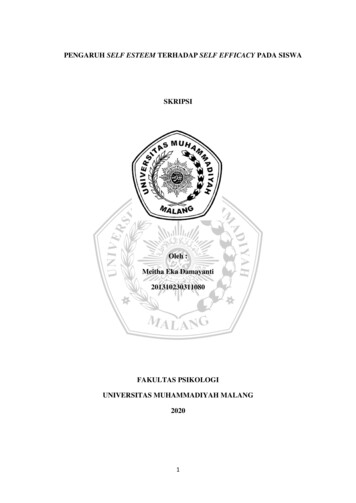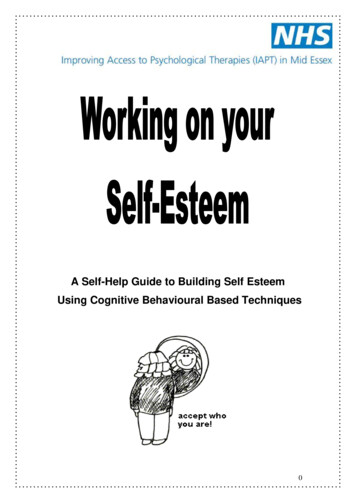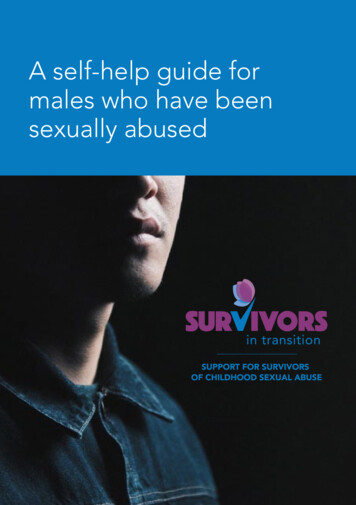
Transcription
A self-help guide formales who have beensexually abused
ContentsWhat is sexual abuse?.3General information.4Part 2: Coping with sexual abuseand living well.24Recent sexual assault.25Part 1: Living well in day-to-day life.7Expectations and making changes.28Staying connected.8Shame.29Eating well.9Tactics of abuse.30Exercise.10Clergy abuse: spiritual andreligious beliefs.31Relaxation.12Mindfulness.14Sleeping well.16Physiological reactionsand sexuality.32Living by your values.18Separating sexuality fromsexual abuse.33Helping others and yourself.20The ‘victim-to-offender’ myth.34Making change happen.21Trust, intimacy and relationships.35Ideas about being a man.22Flashbacks.37Nightmares.39Panic attacks and anxiety.41Deciding to tell?.42Suicial thoughts.44Self-harm.45Alcohol, drugs and self-judgement.46What am I feeling?.47Parenting.49Criminal justice.50Compensation.51Celebrating life.53Useful contacts.54Acknowledgements.55“Boots and all.”
What is sexual abuse?Sexual abuse or sexual assault is any act of a sexual naturewhere one person has not consented or agreed.This includes where a child is too young to consent, or someone is not in a state of mindto understand what is happening. Any sexual act done by an adult to a child is childsexual abuse.It can involve physical violence, but it doesn’t have to. It is still sexual abuse if there wasno physical violence.Sexual abuse often involves less obvious forms of coercion, such as emotionalmanipulation, threats or blackmail.Sexual abuse can involve direct physical contact, but doesn’t have to. Sexual abuse canalso be things like making someone watch or say something they don’t want to.Sexual assault can happen to people of any gender or background.It is when one person or group of people uses power (be it physical emotional, financialor something else) to coerce another.People who commit sexual offences can be of any gender or background.Sexual abuse is a crime.www.survivorsintransition.co.ukA self-help guide for males who have been sexually abused page 3
General informationWho is this book for?You might be reading this because of things that have happened to you personally,or to someone you care about. The idea is for this book to assist adult men who aredealing with problems related to sexual abuse, whether the abuse happened in the pastor quite recently.Men are not all the same!Men face some common social pressures about ‘being a man’, but each man is a uniqueindividual. Given that men are such a diverse group of people, there is no way that everysingle idea in this book will be helpful to every individual man.So please, take up the parts that make sense to you and leave those sections that aren’trelevant right now. You can always come back later.You don’t have to do it aloneIt’s OK to ask for and accept help from other people, and to offer and give help to otherpeople who need it too. Men who have suffered sexual abuse sometimes struggle to dothings to care for themselves.Throughout this book, we want to remind you that you deserve to take care of yourselfand to live a fulfilling life.It is important to understand what is meant by ‘higher risk.’To say that being sexually abused is a ‘risk factor’ for later offending does not mean it‘causes’ later offending.One British study examined the future offending behaviour of boys who had beensexually abused. It found that 88%, the vast majority, did not go on to commitsexual offences.Ways of living wellOur hope is that this book will provide some practical advice about ‘living well’. Whatthat means will be different for each person, but hopefully some of the ideas here willbe of use to you.Many of the ideas here could be helpful for anyone. Other ideas are more specificsuggestions about dealing with the problems that sexual abuse can bring intomen’s lives.page 4 A self-help guide for males who have been sexually abused
Taking a stand against sexual abuseThis might be your first step in looking for some useful information, or you might havebeen working through problems related to sexual abuse for a long time.Either way, picking up this book suggests that you want to take a stand against sexualabuse and the problems it can produce. By taking a stand against sexual abuse andreclaiming your life, you join many, many other men and women.It’s worth repeating: you don’t have to do it aloneSee links at the end of this guide.Tips for using this bookThink about the right time and place to read this book.Is reading this by yourself going to be the best for you, or will it be better to talkwith someone supportive (like a friend, partner or counsellor) about the parts youfind relevant?Have a limit on what you will read at any one time (e.g. one or two sections). Have a penready to mark the ‘tips’ that you find useful.Allow some time – 10 minutes or so – after reading to reflect on what you’ve read andon whether it is relevant or helpful to you.Some people might find it helps to have a journal to write or sketch their responses.Plan to do something fun, relaxing or energising after you have put the book down.It could be something you can do alone or with a friend or partner: Go for a bike ride, a run or a walk Listen to or play some music Prepare a meal with someone Dig in the garden Play a computer game Read a novel or the newspaper Go swimming.Or do something else that’s enjoyable to you and helps you get out of the headspace of‘thinking about abuse all the time’.A self-help guide for males who have been sexually abused page 5
“ The ordinary responseto atrocities is to banishthem from consciousness.Certain violations of thesocial compact are tooterrible to utter aloud: thisis the meaning of the wordunspeakable.“ Atrocities, however, refuseto be buried. Equally aspowerful as the desireto deny atrocities is theconviction that denial doesnot work.“ Folk wisdom is filled withghosts who refuse to restin their graves until theirstories are told. Murderwill out. Rememberingand telling the truthabout terrible events areprerequisites both for therestoration of the socialorder and for the healingof individual victims.”Dr Judith Lewis Hermanpage 6 A self-help guide for males who have been sexually abused
Part 1:Living well in day-to-day lifeEstablishing a solid baseIn this section (Part 1), the focus is on general, day-to-day thingsyou can do for your overall health and well-being. You couldthink of this as establishing a ‘solid base’ to work from. The topicscovered here include:StayingconnectedEating g byyour valuesHelping othersand yourselfMaking changehappenIdeas aboutbeing a manThey are good ideas for anyone, not just men who are dealing with the legacy of sexualabuse. We’d suggest coming back to this section if some of the later topics becomeoverwhelming. The idea of a secure base is about focusing on achievable goals, andputting ‘first things first’. If the basics are not quite in place, like sleeping well andhaving strategies for dealing with day-to-day stress, other problems and challenges willbe much harder to tackle.It does not make the difficult stuff go away, but it does putyou in a better place and frame of mind to deal with it.A self-help guide for males who have been sexually abused page 7
Staying connectedStaying connected to people has a positiveeffect on your general well-being.Feelings of depression can thrive on isolation and loneliness (which is different from‘alone time’).Knowing that other people are there and care about you can make it easier to carefor yourself.Try to make time to catch up with people and avoid being isolated. Mobile phones andthe web are useful tools for staying connected when meeting people face to face isn’tpossible. There might be a range of people in your life that you share different levelsand kinds of connections with: A person you might have a coffee or drink with A person you might share a meal with A person you might do something fun or relaxing with A person you could tell that you are reading this bookRemember that not everyone in your life has to know everything about you.It might be worth making that extra effort to connect with supportive people whogive you extra energy, and taking a break from relationships that seem draining atthe moment.While ideally there may be a few people you would trust to talk to about problemsrelated to sexual abuse, there are probably other people in your life as well.page 8 A self-help guide for males who have been sexually abused
Eating wellEating well is about providing your body and mindwith nutrients that keep you active and alert, aswell as about enjoying the food you eat.Ideally, you want to be eating five servings of vegetables and two servings of fruit a day.Keep your fluid intake up by drinking plenty of water.In the last few years, a lot more people have become interested in food and cooking,and it is certainly more socially acceptable for men to enjoy cooking than it was ageneration ago.Here are some simple tips about eating well Eat a healthy breakfast. Avoid snacking between meals or stick with healthy snacks like fruit and nuts. Plan healthy, quick and easy meals for busy days. Make use of the freezer – cook two to three meals’ worth at a time. Enjoy cooking – experiment with new foods and try new recipes(there are literally thousands of recipes online). Make the most of foods in season. Enjoy mealtimes – turn off the television while you eat. Invite a friend around to eat, or, better yet, to help cook. Eat slowly and savour every mouthful. Listen to your body – stop when you feel full. Try growing your own veggies, fruit or herbs.For more information about eating well, see the links to MIND and theMental Health Foundation.A self-help guide for males who have been sexually abused page 9
ExerciseExercise is linked to positive mental health.It has the ability to change your state of mind in both the short andlong term in ways that give you more energy for dealing with life’schallenges.All adults benefit from at least 30 minutes of moderate-intensityactivity each day. If you can’t do this every day, it still helps to try andexercise fairly regularly. This exercise does not have to be done all atonce; you can break it down into sessions of at least 10 minutes.Different types of activity suit different people. Some people preferteam sports, some people like individual sports. Some people preferto play competitively, others like a more social environment. Somepeople prefer the gym, some prefer games or sports.If you’re not sure what would suit you, try a few things out. You don’thave to be an athlete to boost your fitness. Yoga and tai chi areparticularly recommended.page 10 A self-help guide for males who have been sexually abused
Some people find it really helpful to exercise with a partner orfriend. Exercising with someone has the benefit that you canmotivate, encourage and support each other to go for that walk inthe middle of winter or to the gym when you are still aching fromthe last session.The main thing is that you find something that is fun or gives you asense of achievement.Tips for exercise.As well as structured exercise or activities, there are day-to-daythings you can do that don’t take much time, effort or organisation.Work in an office? eep your walking shoes handy and be active whenever youKhave the chance. Park your car a few blocks from work. Get off the bus or train at the stop beforehand and walk. Take the stairs instead of the lift. Walk up the escalator instead of standing still. alk the longer way around to the photocopier, printerWor fax machine. njoy a walk during your lunch break or team up with a friendEto walk after work. Walk to your colleague’s office instead of sending an email.At home: alk around while you’re talking on a cordless orWmobile phone. Do some gentle stretches or sit-ups while watching TV. Use TV ad breaks as a chance to do a quick household chore. o some energetic house-cleaning, gardening or odd jobs onDthe weekend. Park the car further away when going to the supermarket.A self-help guide for males who have been sexually abused page 11
RelaxationBasically, relaxation exercises are short, focused routineswith a specific purpose in mind – usually to slow downyour breathing or relax you when you’re tense.The ability to gently slow your breathing, relax your muscles and calm yourself is auseful life skill. Learning to simply take some quiet time, that is not about ‘gettingsomething done’, can help you to relax and feel fresh and energised.Some people who have survived trauma find that imaginative relaxation –focusing on an image or thought that is calming and soothing – works as well asbody-centred approaches.Men who have been subjected to traumatic experiences, including sexual assault, canfind relaxation difficult. At one time, staying alert, constantly checking for danger, mighthave been necessary in order to stay safe and reduce harm.page 12 A self-help guide for males who have been sexually abused
The first challenge can be to consciously notice when you are tense– your body and mind might have got in the habit of being on guardto the extent that you hardly notice it.So it can initially feel unsafe to drop your guard, and it can takepractice and be a bit of a risk to accept that there might be someplaces and times where you are actually safe from harm. Thereare significant health benefits when you can learn to stop beingconstantly tense and on guard.Tips for relaxation.Learning to breathe deeply and relax your body helps with yourgeneral ability to rest, as well as recharging your batteries. Below isone simple relaxation exercise, focusing on breathing and on tensingand relaxing your muscles.The Living Well website has more to try.1. Find a safe, quiet spot and sit in a comfortable but uprightposition in a chair or on the ground (try not to slouch).2. Plant your feet or hands firmly on the ground – push them intothe ground and feel that the ground is solid.3. Gently clasp your hands together in front of your stomach, justbelow your belly button.4. Begin to notice your breathing -the pace, the depth, etc.5. When you are ready, take a slow, deep breath in throughyour nose.6. Breathe in, without causing pain, for about five seconds.7. At the same time as you breathe in, grip your hands together,like your hands are trying to pull in opposite directions. Use themuscles in your arms as well. Stop if you are hurting yourself, andtry again with a bit less pressure.8. Slowly breathe out through your mouth, releasing the air in asmooth controlled flow (again, about five seconds).9. At the same time as you breathe out, relax your hands and arms.Repeat steps 5-9 three or four times.A self-help guide for males who have been sexually abused page 13
MindfulnessYou might have heard the term ‘mindfulness’.This is related to relaxation but they are slightly different things. Mindfulness is aboutpaying attention to things about yourself and your environment that would normally gounnoticed. Mindfulness allows us to step away from negative thoughts and feelings thatoften seem so compelling.Practising mindfulness is useful in and of itself, not just when you are having difficulties.You can incorporate it into your everyday routines, such as practising mindful walking ormindfully drinking tea or coffee.By consciously using mindfulness in as much of your day as possible, you increase yourawareness and enhance your sense of control and choice.A ‘trap’ for men trying to use mindfulness is feeling pressure to ‘get it right’, orthinking that you ‘just don’t get it’. There will be times when you doubt your ability topractise mindfulness.page 14 A self-help guide for males who have been sexually abused
Expect that you will become distracted and doubt your ability to‘do’ mindfulness. This is part of the practice. Simply try to noticethe doubtful thoughts, and return to your anchor (‘anchor’ isexplained on the next page).Another challenge: mindfulness goes against the idea that men are‘doers’.Learning to notice things without trying to assess or change themmight feel difficult. The idea that you should do something willalmost certainly occur; try to simply notice that thought, then comeback to your anchor.A short mindfulness exercise.This introductory exercise is adapted from ThinkMindfully.com. egin your practice by anchoring your attention to your breath.BYou can think ‘in’ on the in breath and ‘out’ on the out breath.Your breathing is your anchor. Return your attention to youranchor whenever you need to. Whenever a thought, feeling or sensation arises, notice what isgrabbing at your attention and label the experience. Try to observe each thought that arises with an accepting,curious, welcoming attitude. Don’t judge the thoughts and labelthem good or bad, just observe them arise as you would leaveson a stream, watching each leaf go by. Let all thoughts drift out of awareness on their own. You don’thave to push them away because they will naturally pass ontheir own, in order to make room for the next ‘leaf’ to go by. After noting each thought, simply draw your attention back tothe breath, and once again think ‘in’ on the in breath and ‘out’on the out breath.Try doing this for five minutes to start with. As you get more into it,you can try stretching out the exercise over a longer time.A self-help guide for males who have been sexually abused page 15
Sleeping wellA good night’s sleep helps you to recover fromthe previous day and get ready for the next one.Sleep helps us to think more clearly, manage difficult situations betterand feel more energetic. Although it’s generally agreed that eight hours’sleep is ideal, the most important part of sleep is the ‘deep sleep’phase: the first five hours after you fall asleep. However, regularly gettingless than five hours’ sleep a night will eventually take its toll. Stress canget in the way of a good night’s sleep.There can be a cycle of worry, where anxiety about not being ableto sleep makes it even harder to relax. Being worried about havingnightmares can also make it hard to relax and get to sleep.page 16 A self-help guide for males who have been sexually abused
Poor-quality ‘deep sleep’ can lead to: Tiredness during the day Poor concentration Irritability Aches and pains in the muscles and bones An immune system that doesn’t work well, leading to frequent illness Longer periods of depression.Tips for sleeping well If possible, try to establish a consistent routine. Go to bed at the sametime every night. pend 30 minutes doing something relaxing before bed. AlthoughSwatching TV or playing a computer game might be consideredrelaxing, some people find it doesn’t really help with getting tosleep. Try reading a book, doing a relaxation exercise or taking awarm shower. ake sure your bed is comfortable: it is worth investing in goodMsheets and pillows. ry to avoid drinking lots of fluid just before bed, orTclock-watching. et up at the same time every morning, even if you had a bad night.GTry to resist the temptation to have ‘just a little bit more’ sleep! o something to ‘wake yourself up’ in the morning, like a quick walk,Drun or bike ride.If you have been having long-term sleeping problems, you know that itis not easy to change. It might be time to seek expert help.This could be from your GP or other health practitioner, or a counsellorwho deals with sleep problems. If things are really serious, there are alsosleep clinics that provide intensive treatment.A self-help guide for males who have been sexually abused page 17
Living by your valuesDealing with distressing experiences like memories of sexualabuse, anxiety and depression takes a lot of our energy, and attimes it might feel like it takes all you’ve got just to stay afloat.In order to get ourselves in a better place to deal with these difficulties and life’sproblems in general, it is worth putting some time and energy into identifying what youstand for as a person: what you value.Our values act as a kind of reference guide or compass for who we are, how we actin particular situations and where we want to go in life. If we possess a clear sense ofpurpose and direction, and act according to our values, then we are less likely to feeloverwhelmed or be knocked off course when we experience challenging situations.page 18 A self-help guide for males who have been sexually abused
Our values might be based on how we were brought up, on religiousor spiritual tradition, or on a particular set of ethics or an approachto life that we have adopted. We might value being calm, honest orconsiderate, ‘giving people a fair chance’, being creative, thoughtful orreliable, or ‘doing our best’. Whatever the history of our values, they areessentially our sense of the right way for us to live.When we act in accordance with our values, we generally see our life aspurposeful and meaningful.Tips for identifying your values.We usually hold our values implicitly; in other words, we don’t oftenconsciously think about and name our values in a structured way.By identifying our values, we establish a basic guide for ourselves in ourlife.Take some time to think about the following areas of life, and try towrite or say a sentence or two about what is important to you: what kindof person do you want to be and how would you like to act in theseareas of life? (Some possible values are listed.)Family relationships – Caring, supportive, respectfulParenting – Loving, caring listenerFriendships – Honest, mateship, ‘being there when needed’Work – Hard-working, acting with integrity, efficient, reliableEducation – Open-minded, informed, ‘doing my best’Recreation, leisure – Fun, relaxing, life experiencesSpirituality – Consideration, tolerance, compassionCommunity involvement – Commitment, giving back, connectingwith peopleHealth and well-being – Quiet time, variety, generosity to othersAs you do this, you might identify some small steps that you can takein line with your preferred way of living. This approach to life doesnot mean we are never confronted by difficult situations, unwelcomethoughts or uncomfortable feelings. It is just that our focus is on calmingand centring ourselves and acting in accordance with what we haveestablished as our preferred, valued way of living life.A self-help guide for males who have been sexually abused page 19
Helping othersand yourselfSometimes you can lose sight of the factthat you have something to offer.Doing things for other people actually has a beneficial effect on developingour own well-being. Recent research in neuroscience shows that helping othersand working cooperatively activates and strengthens certain parts of the brain,enhancing well-being.Doing things to help others influences your perception of yourself and theworld. The more that people see you as a person with skills and abilities, themore you are able to see yourself that way. In putting this into practice it isimportant to take care of yourself, to check that you are not doing this out ofduty or continuing a habit of always putting others before yourself. For somemen, accepting help becomes easier if they can also do something in turn thathelps someone else.You could put this into action in any way that suits you. It might be volunteeringwith a formal organisation, offering to help a friend or an elderly neighbour, ormaking time to listen to someone you know who is having a hard time.In helping others, take time to notice the conscious choice you made to offerassistance and consider how this fits in with the kind of person you want to be.page 20 A self-help guide for males who have been sexually abused
Making change happenChange rarely happens in a neatly staged or organised way.Making changes to address unhelpful habits or to develop more useful patterns ofbehaviour requires focus, effort and repetition.Below is a basic map to help ‘track change’I don’t know or want to know – You don’t see a problem or need to change. Others’efforts to convince you of a need for change are generally ineffective.I’m thinking about it – You see that there’s a problem you want to get some controlover, and you’re evaluating the pros and cons. Others hear you talking about problem(s)and options.I want to, I’m getting ready – You are ready to change and make things happen.Others help by encouraging you and strengthening your motivation.I’m doing it – You’re taking active steps to modify your behaviour and/or environment –in your own unique way. Others can help by noticing positive changes.I’m staying on track – Change has been made and maintained for a few months.Although there are occasional ‘bumps in the road’, you refuse to be derailed and knowwhat it takes to stay on track.When seeking to make change, remember that safety is a foundation stone of buildinga solid base for yourself and the well-being of those close to you.A self-help guide for males who have been sexually abused page 21
Ideas aboutbeing a manEvery man has his own experiences andbeliefs about what it means to be a man.Gender is a significant part of personal identity, along with a range ofother things that ‘make up’ our sense of who we are: cultural background,physical ability/disability, sexual preferences, religion, family, where welive. the list goes on.While every man is unique, men face some common social pressuresabout how they should behave, feel and think. These pressures caninfluence how men respond to different situations at different times.Men can feel under pressure to: Deal with problems alone Always be in control Express only a limited range of emotions Never admit any vulnerability.There are times when these qualities can be helpful. In a crisis oremergency, and in some kinds of work, the ability to ‘keep a level head’or ‘hold it together’ are highly valued and sought after (such as in theemergency services, the armed forces, or business).However, a difficulty with these expectations ‘to be a man’ is that theycan become quite restrictive. They can lead to men isolating themselves,becoming reluctant to talk about what is going on for them. Theseexpectations can lead to men becoming overly self-critical. Thesejudgements might come from people around them, too.Unfortunately, these pressures can have men evaluating and judgingthemselves in unhelpful ways. They can lead to men being down onthemselves for ‘being tricked’, for ‘not fighting hard enough’, for ‘notbeing able to cope’, for ‘not measuring up’, when they would benefitmost from understanding and encouragement.page 22 A self-help guide for males who have been sexually abused
Unrealistic expectations to ‘man up’, to ‘push through’ and ‘just get onwith it’, can lead to men feeling they have to work through problemsalone. They can have men believing it is a sign of weakness to ask for helpwith personal problems, difficult thoughts or feelings.Yet in other areas of their life, men will routinely gather all the informationand support they can. If you have a problem with your car you can’t fix,you take it to a mechanic or a friend who knows about cars.A challenge we face as men is to be aware of these expectations, whilemaking sure they don’t restrict our choices and willingness to accesssupport that helps us build the kind of life we want to live.Some questions to consider Are there times you are particularly aware of expectations about howyou should handle situations as a man? Do you sometimes find yourself wondering about these expectations,and whether they really suit you or those around you? Have there been times when you’ve done what’s best, even if it hasgone against some ideas about ‘being a man’?A self-help guide for males who have been sexually abused page 23
Part 2:Coping with sexualabuse and living wellIn this section (Part 1), the focus is on general, day-to-daythings you can do for your In Part 2, we will be talking morespecifically about some common problems faced by mendealing with child sexual abuse or adult sexual assault.The following issues are covered, and there are some practical tips on dealingwith most of them: Recent sexual assault Panic attacks and anxiety Expectations and making changes Deciding to tell? Shame Suicidal thoughts Tactics of abuse Self-harm Clergy abuse: spiritual and religious beliefs Physiological reactions and sexuality Alcohol, drugs andself-judgement Separating sexuality from sexual abuse What am I feeling? The ‘victim-to-offender’ myth Parenting Trust, intimacy relationships Criminal justice Flashbacks Compens
Enjoy cooking - experiment with new foods and try new recipes (there are literally thousands of recipes online). Make the most of foods in season. Enjoy mealtimes - turn off the television while you eat. Invite a friend around to eat, or, better yet, to help cook. Eat slowly and savour every mouthful.





